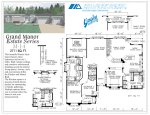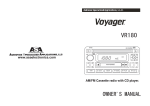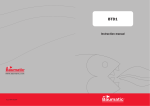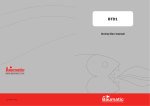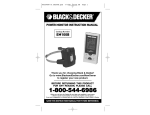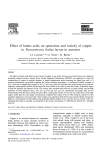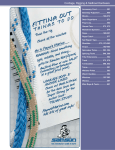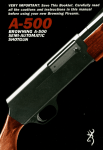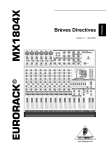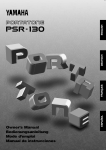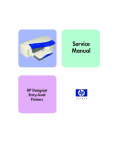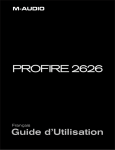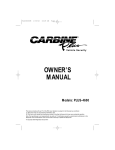Download TriStar Model Vehicle 1863 User's Manual
Transcript
TriStar Sporting Arms SHARPS MODEL 1863 PERCUSSION RIFLE AND CARBINE MODEL 1874 METALLIC CARTRIDGE RIFLE AND CARBINE INSTRUCTION MANUAL 1 Congratulations…… and thank you for purchasing a quality IAB firearm. This firearm was imported by TriStar Sporting Arms and manufactured by IAB, which is located in the heart of Italy’s Valtrompia Valley, an area famous for its fine firearms craftsmanship. Known as a world leader in the manufacture of reproduction SHARPS RIFLES and CARBINES, IAB was the first Italian company to reproduce these classics characterized as some of the most popular guns in American history. Our craftsmen have produced over 49,000 quality SHARPS reproduction firearms since our beginning in 1974. IAB is proud to carry on the SHARPS manufacturing tradition of a quality firearm at an affordable price. IAB SHARPS RIFLES are assembled and finished just as they were over 100 years ago. They are perfect recreations of the original in every respect including stocks made from select European walnut and quality rifling made with precision broaching equipment. All IAB rifles are assembled by hand and finished to the exacting requirements necessary to win approval by the Italian Proof House. All firearms are test fired to ensure proper function of working parts and compliance with stringent chamber pressure requirements set by the Proof House. This assures all customers a quality firearm which meets stringent Italian requirements for safety and function. The SHARPS has long been known for its accuracy beginning in the American Civil War and continuing up through the buffalo hunts and long range shooting competitions popular during the late nineteenth century. There is no wonder the frontiersmen named it “Old Reliable” and American Indians referred to it as the gun that would “shoot today and kill tomorrow”. Both descriptions attest to its dependability and long range accuracy. Today’s competition shooters, hunters, and living-historians relive many of the thrills their forefathers experienced by owning this magnificent firearm. We are pleased you have chosen a quality SHARPS replica manufactured by IAB. By following the instructions found in these pages, you should enjoy many years of shooting enjoyment from your rifle or carbine. Please read this manual completely before firing your TriStar firearm. 2 Important Safety Rules 1. If you do not thoroughly understand the proper use and care of firearms, DO NOT ATTEMPT TO SHOOT THIS GUN. Seek advice from someone you know to be a competent authority in the care, use, and handling of firearms. 2. Keep this firearm pointed in a safe direction at all times. 3. REMEBER TO TREAT EVERY FIREARM AS IF IT IS LOADED! 4. Never operate this firearm without proper eye and hearing protection. 5 Keep your finger off the trigger until you are ready to shoot. NEVER “set” the set type triggers until you are ready to fire the gun. 6. Check to be sure the barrel is clear of any obstruction before loading the gun. Remember to repeat this procedure each time before reloading the gun. 7. NEVER place a loaded firearm in a vehicle or lean the gun against any object where it might fall over and accidentally discharge. When this firearm is not in use, it should be emptied of any charge or cartridge and placed in a case or suitable protected location. NEVER store this gun loaded! 8. KEEP ALL GUNS OUT OF THE REACH OF CHILDREN! You should store this gun and its ammunition separately. 9. Avoid the use of drugs or alcoholic beverages prior to or during the use of this or any other firearm. 10. Always conduct yourself in a safe and responsible manner when using this or any other firearm. Do not abuse your shooting and hunting privileges. Please read this instruction manual carefully and thoroughly. Familiarize yourself with the function of your firearm before loading and firing. If you are unsure about any aspect of proper gun use and handling, seek knowledgeable instruction before attempting to use your gun. 3 This manual includes instructions for the use and care of both percussion and metallic cartridge rifles and carbines. Please refer to the proper section for your rifle or carbine . Section I: Model 1863 Percussion Rifle and Carbine Step 1 - Initial Cleaning Before firing your percussion Sharps for the first time, you should remove any excess factory lubricants applied to protect the gun during shipping. This process will be great ly simplified by field stripping the gun. (Please refer to the “Disassembly and Cleaning” section for field stripping instructions). Once this initial cleaning is completed, the gun should be re-lubric ated with quality gun oil. The initial cleaning process should include s wabbing the bore with several dry cleaning patches to remove all excess oil. The barrel must be clean, dry, and free of obstructions prior to firing. Step 2 – Loading The first step in the loading process is to make sure the muzzle of the gun is pointed in a SAFE DIRECTION! Your S harps rifle or carbine can be fired using either paper cartridges or bullet and powder. Each method is covered herein. Before loading either a paper cartridge or powder and bullet, one or two perc ussion caps should be fired to clear any obstructions or excess oil from the nipple and flame channel. PAPER CARTRIDGE LOADING Your Sharps rifle or carbine can be fired using paper cartridges. cartridges can be found at the end of this section. Instructions for making paper To load your gun with a paper cart ridge, first plac e the hammer in the SAFE position by pulling it back into the half-c ock notch. Next the trigger guard/lever should be extended fully downward which will lower the breech block and expose the chamber. Carefully insert the paper cartridge into the chamber until the bullet seats firmly against the rifling. To insure a complete charge, sufficient pressure should be applied to the cartridge to slightly compact the powder charge in the cham ber. Return the trigger guard/lever to the clos ed position... When the breech block is returned to the closed position, the back of the paper cartridge will be sheared off, exposing the powder to the flame channel. Once the breech i s closed, the gun should be turned over, allowing any excess powder to fall away from the action. This step i s very IMPORTANT to ensure safe operation of the gun. Your Sharps rifle or carbine is now ready for firing. POWDER AND BULLET LOADING 4 Your Sharps rifle or carbine can be fired using powder and a bullet of the proper caliber. To load y our gun with powder and bullet, first place the hammer in the SAFE position by pulling it back into the half-cock notch. Carefully insert a bullet of the proper caliber into the chamber, making sure it is firmly seat ed against the rifling at the front of the chamber. Next, fill the remaining chamber space with FFg black powder, Pyrodex, or an approved black powder substitute. To ensure a full charge, you should slightly overfill the chamber. The chamber of a .45 caliber rifle or carbine should hold between 50 and 60 grains of powder. Rifles and carbines in .54 caliber s hould hold bet ween 60 and 80 grains of powder. No .45 caliber rifle or carbine should be loaded in excess of 60 grains of powder. No .54 caliber rifle or carbine should be loaded in excess of 80 grains of powder. The breec h should now be carefully closed. When the breech block is returned to the closed position, any excess powder in the chamber will be pus hed away from the back of the chamber. Once the breech i s closed, the gun should be turned over, allowing excess powder to fall away from the action. This step i s very IMPORTANT to ensure safe operation of the gun. Step 3 – Firing With the barrel pointed in a safe direction, cap the rifle or carbine with a musket cap and pull the hammer all the way to the rear full -cock position. If y our gun has a single trigger, you may now take aim at the target and fire the gun by pulling the trigger. DOUBLE SET TRIGGERS: If y ou gun has a double set trigger, you may fire it by simply pulling the front firing trigger, or you may use the set trigger to gain a much lighter trigger pull. To use the double s et trigger feature, you must first pull the rear set trigger to engage the front firing trigger. Once you have set t he trigger you may take aim at your intended target and fire the gun by applying a very slight pressure to the front firing trigger. Never load or cock the rifle with the triggers set. The tri ggers should only be set after the rifle has been laded, the hammer cocked and the rifle pointed at the intended target. HOW THE DOUBLE S ET TRIGGER MECHANISM WORKS: When the rear trigger is pulled, it clicks into a sear notch on the front trigger. Once this operation is done, the front trigger c an be pulled, releasing the rear trigger whic h releases and flies upward hitting the lock sear which discharges the gun. You may adjust the pressure required to fire the gun by turning the screw located bet ween the two triggers either clockwise or counter clockwise to obtain the desired trigger pull . THE GUN MUST BE UNLOADED BEFORE MAKING ANY TRIGGER ADJUSTMENTS! IN THE EVENT YOUR RIFLE OR CARBINE DOES NOT FIRE WHEN THE TRIGGER IS PULLED, YOU SHOULD FOLLOW THE PROCEDURE OUTLINED BELOW: 5 If your rifle or carbine fails to fire when the trigger is pulled, CONTINUE TO POINT THE GUN IN A SAFE DIRECTION FOR A T LEAST TWO MINUTES BEFORE ATTE MP TING TO UNLOA D IT. After waiting at least two minutes, wit h the barrel pointing in a s afe direction, carefully remove the musket cap. Next, with the muzzle pointed at the ground, tap the side of the gun a few times to settle any loose powder away from the breech block. Lower the trigger guard, lever to open the breech and expose the powder charge. You should next carefully rot ate the gun to place the top of the receiver toward the ground, while continuing to keep the muzzle pointed at the ground. This will ensure that any loos e powder will fall directly to the ground and not collect inside the lever spring mortise. Next, raise the muzzle, allowing ALL powder in the chamber to fall to the ground. Once the powder is removed, you may use a cleaning rod or dowel to push the bullet from the chamber. Disassembly and Cleaning Before attempting to disassemble your rifle or carbine, you must make sure it is UNLOADED! FIELD STRIPPING: With the action closed, pull the hammer rearward to the Safe position. Locate the lever hinge pin (Part # 02) on the right side of the receiver near the rear of the forearm. Next to the lever hinge pin is a small plunger pin that acts as a lock to prevent the lever from rotating accidentally. Depress the small plunger pin which will allow the lever hinge pin to be rotated approximately 180 degrees. With the rifle turned upside down, rotate the lever hinge pin forward and backward slightly while pulling outward to remove it. Slide the trigger guard/lever and breech block out of the rifle. This completes the field stripping process. Further disassembly of your Sharps rifle or carbine should only be attempted by a competent gunsmith. Reassembly is accomplished in reverse order. 6 CLEANING: Due to the corrosive nature of black powder, it is imperative that your Sharps rifle or carbine be thoroughly cleaned after each shooting session. It may also be necessary to swab the barrel periodically after a few shots to maintain accuracy. After field stripping the gun, the action maybe be cleaned using warm soapy water or a quality black powder solvent. The barrel should also be cleaned to remove any fouling. After the gun is thoroughly cleaned, it should be lubricated with quality gun oil. One area of the Sharps action that requires special attention when cleaning is the gas check plate located on the front face of the breech block. The purpose of this plate is to seal the rear of the chamber when the powder is ignited. If the gas check plate is not removed and cleaned regularly, it will become fouled, rendering it ineffective in sealing the breech. This leakage can permanently damage the gas check plate and possibly cause injury to the shooter. To remove the plate, loosen it by carefully working the edge of a knife blade around the joint between the plate and the breech block. Clean the gas check plate and breech block with warm soapy water or solvent. Before reassembly, lubricate the gas check plate with a thin coat of grease. Press the plate back into the breech block prior to re -assembly. By cleaning your Sharps rifle or carbine after each shooting session, it should give you many years of reliable service. MAKING PAPER CARTRIDGES During the American Civil War, Sharps rifles and carbines were usually fired using nitrated paper or linen cart ridges. These cartridges are no longer commercially available but are easily made. The first step is to make the nitrated paper which is simply a light weight, high “rag bond” paper soaked in a saturated potassium nitrat e solution. A sat urat ed solution is made by adding potassium nitrate to water until it will dissolve no more of the chemical. Best res ults are achieved if the water is slightly above room temperature. Place the saturated potassium nitrat e solution in a flat pan. Next place the paper into the pan and allow it to become completely saturated wit h the solution. Remove the saturated paper from the solution and allow it to completely dry. The dried paper is cut to the shape shown below. 7 Roll the cut nitrated paper around a dowel the same diamet er as the bullet you are shooting. Using a glue stick, glue the paper along the edge to form a cylinder. Press the bullet into the cylinder, sliding it all the way through until it protrudes from the end. At this point, the bullet can be attached to the paper cylinder with glue, or a silk thread can be tied around the cylinder, directly over the bullet lube groove. Pour a measured charge of black powder into the cylinder and fold the open end of the cylinder over, sealing it with glue. The cartridge is now ready for use. NOTE: Cigarette paper can be substituted for nitrated paper provided it is of the proper length to allow loading wit h a complet e powder charge. NEVER ATTEMPT TO FIRE SMOKELESS POWDER IN YOUR P ERCUSSION RIFLE OR CARBINE! 8 ADVICE FROM THE FIELD The Sharps carbine proved to be one of the most effective weapons used during the American Civil War. As the first practical breech loader, it was highly sought after by participants from both sides of the conflict. Like any new weapon, the Sharps were not without its problems. Most of these problems could be easily solved by proper care and cleaning. Modern Sharps reproductions share many of the same characteristics of those early classics. It is not uncommon for today’s Sharps shooter to experience some of the same difficulties encountered by the Civil War soldier. Today’s modern reproduction Sharps carbines see frequent action with members of the North-South Skirmish Association (N-SSA). Tony Beck, an active member of the N-SSA has written many articles on the history and use of firearms used in the Civil War. In an effort to assist N-SSA users of Sharps carbines, he has written an article entitled “Care of the New Breechloaders.” This highly informative article is written in a style, which creates a Civil War era for the reader. Tony has graciously given the writer of this manual permission to include the article here for your enjoyment. Care of the New Breechloaders By Tony Beck (Not e: The following article on the care and cleaning of breechloaders was originally printed in a Company Newsletter in a style which creat es a Civil War era for the reader. However, all of the methods mentioned for cleaning etc. are proven modern, safe methods.) It has come to the attention of the ordnance office that some of the troops have been experiencing difficulties with the new breech loading Sharps carbines now being introduced into our service. These arms are the most perfect yet invented, but do require special attention to keep in proper order. The armorors therefore wish to provide the following advice on the care and maintenance of the Sharps carbine, as manufactured in Richmond and the north, in order to improve our effectiveness in the field. Comments on Reports from the Field Reports of the Sharps bursting in battle have recently reached headquarters. It has been found that these instances are greatly exaggerated. There is a feature of the Sharps system weapons, both as produced in the north and by o ur government, which may cause the forestock to split on discharge. If the breech is opened with an undischarged round in the chamber, powder trapped in the breech block can accumulate under the lever spring in the fore stock. When the arm is then closed and fired, this accumulated powder may also explode. The stock will usually split and may injure the shooter. If there is a failure of the arm to take fire after repeated 9 attempts, it is imperative that the following procedures be used to clear the weapon. Elevate the muzzle as nearly vertical as possible before opening the breech. With the breech open, use a cleaning rod introduced through the muzzle to drive out the cartridge. Insert a new round and close the breech. Only then can the muzzle be lowered. If the breech must be opened with the gun held level, remove the breechblock and clear any accumulated powder from the recesses at the front of the frame before reloading. When the arm is to be loaded after being cleaned, it must first be cleared by firing at least two caps. The vent channel in the breech block is rather long and tends to accumulate oil when properly cleaned, which can lead to misfires. A large quantity of smoke should be visible in the barrel on opening the breech, if the breech block’s vent is clear. Reports have also noted that excessive friction may develop in the breech after several rounds have been fired. This is due to an accumulation of fouling within the frame. The breech joint is as perfect as can be made by modern science, but it does still leak. This causes fouling to deposit between the breech block and frame. When the lever becomes excessively tight, spitting on the inside of the frame with the breech open will moisten this fouling and usually relieve the problem. Do not hesitate to take this action; it will not injure the mechanism. If the lever is bent in forcing the breech closed, the weapon may no longer fire as the block will not be restored to its proper position. Cleaning Most of the problems experienced with the Sharps pattern guns are the result of incomplete cleaning. Unlike the musketoons, which can be cleaned with little effort, the new carbines require complete disassembly of the breech mechanism to be cleaned properly. There are many small parts which become clogged and jammed with accumulated fouling. These require careful attention. If not maintained, the joint at the breech will become excessively tight and leak gas, rendering the weapon unserviceable. To clean the Sharps, the breech mechanism must be disassemb led. To accomplish this, first open the breech. Next, the lever pivot pin must be withdrawn. Depress the catch ahead of the pivot pin arm and rotating the arm one quarter turn away from the frame. Next, gently rotate the pin back and forth while pulling it out of the frame. DO NOT STRIKE the pin or its arm. If the gun is very foul, the pin may be quite tight. Moisten the joint between the levers and frame to loosen the pin. With the lever pivot pin removed, the breech block may be withdrawn. This is done b y gently tapping the block out the bottom of the frame with a wooden dowel or the handle of a small hammer. In order to free the lever from the breechblock, remove the screw in the right side of the block. Soak the block in HOT soapy water. While the block is soaking, clean the barrel and frame in the usual manner. Original Sharps, and some reproductions, have a sealing sleeve in the breech, which should be removed to be cleaned and oiled separately. Once the barrel and frame are clean and dry, they must be thoroughly oiled before being set aside. With the barrel clean, return to the breechblock. The gas check plate must be removed and cleaned separately. This is done by gently prying up the sides of the plate with a knife blade. Finally, hold the breechblock cone under a stream of running water and check that water runs out of 10 the vent in the front of the block. If it only drips, or fails to flow at all, remove the cone and cleanout screw. Thoroughly clean the vent channel with a pipe cleaner or small drill. Some guns have been found with undersize vents. If excessive fouling of the vent is a problem, it may be necessary to enlarge the passage. Once all the parts are cleaned and oiled, the weapon can be reassembled. Be careful not to strike the gas plate with anything but wood when seating it in the breech block, and then only gently. When reinstalling the lever in the frame, it will be necessary to push it firmly into place in order to drive the pivot pin home. The federally made carbines have an automatic priming device incorporated into the lock. This will allow fouling to enter the mechanism. This area should be kept well oiled and the lock should be removed and cleaned occasionally. When properly cleaned, the Sharps carbine will render reliable service in the coming campaigns. By using these simple procedures, the new breechloaders will greatly increase our effectiveness in the field. © 1998 by A. M. Beck Section II: Model 1874 Cartridge Rifle and Carbine CARTRIDGES The 1874 Sharps rifle or carbine is available in several calibers. You will find the caliber for which your rifle is chamber stamped on the barrel near the rear sight. YOU SHOULD NEVER A TTEMP T TO FIRE A CA RTRIDGE IN YOUR RIFLE THA T IS NOT THE SAME CALIBER AS S TAMPED ON THE BARRE L... Your 1874 S harps rifle or carbine is a modern copy of a black powder firearm and is intended to use cartridges loaded with black powder, Pyrodex, or an approved black powder substitute. Factory loaded cartridges can be used provided they are loaded to appr oximate black powder pressures. You should verify wit h the cartridge manufacturer t hat his cartridges do not exceed black powder pressures. UNDER NO CIRCUMSTANCES SHOULD SMOKELESS POWDE R LOADS BE USED THAT EXCEED FACTORY LOAD SPE CIFICATIONS OF BLACK POWDER PRESSURES AND VELICITIES. THE GUN OWNE R ASSUMES ALL RISKS ASSOCIATED WITH FIRING RELOA DS . If you are using cartridges loaded with black powder or Pyrodex, it may be necessary to s wab the bore after every few shots to insure good accuracy and easy loading. This is necessary because fouling builds up in t he front of the chamber, interfering with proper cart ridge seating. Such fouling can be removed with a properly sized bore brush dipped in water and used to scrub the front of the chamber clean Step 1 - Initial Cleaning Before firing your 1874 Sharps for the first time, you should remove any excess factory lubricants applied to protect the gun during shipping. This proc ess will be greatly simplified by field stripping the gun. (Please refer to t he “Disassembly and Cleaning” section for field stripping instructions). Once this initial cleaning is completed, the gun should be re-lubricated wit h quality gun oil. The initial 11 cleaning process should include swabbing the bore with several dry cleaning patches to remove all excess oil. The barrel must be clean, dry, and free of obstructions prior to firing. ..Step 2 – Loading The first step in the loading process is to make sure the muzzle of the gun is pointed in a SAFE DIRECTION ! To load y our metallic cartridge Sharps, first plac e the hammer in the half -cock notch and engage the safety by moving it up between the firing ping and breec h block. Failure to do this can lead to a broken firing pin should the breech block be lowered with the hammer contacting the firing pin. With the gun point ed in a safe direction, lower the breech block by moving the lever/trigger guard downward. Check to be sure there is no fouling or obstructions in the barrel ... Place a cartridge of the proper caliber in the chamber and push it fully forward. The cart ridge should insert easily into the chamber. If it does not, remove it immediately and check to be sure it is the correct caliber. UNDER NO CIRCUMSTANCES S HOULD YOU ATTEMPT TO FORCE THE CARTRIDGE INTO THE CHAMBER BY USING ANY OBJE CT OR THE BREE CH BLOCK... You should never attempt to load any cartridge on which the primer is prot ruding above the surface of the shell base. Failure t o follow this advice can lead to accidental firing of the cartridge when the breech block is closed. With the cartridge correctly seated in the chamber and the gun pointed at the intended target, raise the breech block by pulling the lever/trigger guard upward Bring the hammer to the full -cock position, pivot the safety out of the safe position. If your gun is equipped wit h a single trigger, you may now fire it by simply pulling the trigger. If your gun is equipped with double set triggers, please refer to the section below for instructions on firing. Immediately after firing, moves the hammer to the half cock position, move the safety to the safe position and lower the breech block. This will allow the extractor to push the fired case out of the chamber to a point where it can be retrieved with the fingers. DOUBLE SET TRIGGERS: If y ou gun has a double set trigger, you may fire it by simply pulling the front firing trigger, or you may use the set trigger to gain a much lighter trigger pull. To use the double s et trigger feature, you must first pull the rear set trigger to engage the front firing trigger. Once you have set t he trigger you may take aim at your intended target and fire the gun by applying a very slight pressure to the front firing trigger. Never load or cock the rifle with the triggers set. The triggers should only be set after the rifle has been loaded, the hammer cocked and the rifle pointed at the int ended target. HOW THE DOUBLE S ET TRIGGER MECHANISM WORKS: When the rear trigger is pulled, it clicks into a sear notch on the front trigger. Once this operation is done, the front trigger c an be pulled, releasing the rear trigger whic h releases and flies upward hitting the lock sear which discharges the gun. You may adjust the pressure required to fire the gun by turning the screw located bet ween the two triggers either clockwise or counter clockwise to obtain the desired trigger pull . THE GUN MUST BE UNLOADED BEFORE MAKING ANY TRIGGER ADJUSTMENTS! 12 Disassembly and Cleaning Before attempting to disassemble your rifle or carbine, you must make sure it is UNLOADED! FIELD STRIPPING: With the action closed, pull the hammer rearward to the “Safe” position. Locate the lever hinge pin (Part # 02) on the right side of the receiver near the rear of the forearm. Next to the lever hinge pin is a small plunger pin that acts as a lock to prevent the lever from rotating accidentally. Depress the small plunger pin which will allow the lever hinge pin to be rotated approximately 180 degrees. With the rifle turned upside down, rotate the lever hinge pin forward and backward slightly while pulling outward to remove it. Slide the trigger guard/lever and breech block out of the rifle. This completes the field stripping process. Further disassembly of your Sharps rifle or carbine should only be attempted by a competent gunsmith. ASSEMBLY: Assembly is completed by performing the above steps in reverse order. P lease follow these instructions when replacing the breech block. 1. Lay the extractor in the extractor slot located in the breech block. 2. Hold the rifle with the barrel pointed upwards. Slide the breech block into the bottom of the receiver. 3. Lift the extractor into the closed position as you move the breech block up into the receiver. 13 CLEANING: Due to the corrosive nature of black powder, it is imperative that your Sharps rifle or carbine be thoroughly cleaned after each shooting session. It may also be necessary to swab the barrel periodically after a few shots to maintain accuracy. After field stripping the gun, the action maybe be cleaned using warm soapy water or a quality black powder solvent. The barrel should also be cleaned to remove any fouling. After the gun is thoroughly cleaned, it should be lubricated with quality gun oil. By cleaning your Sharps rifle or carbine after each shooting session, it should give you many years of reliable service. 14 Parts Diagram (For Both Cartridge and Percussion Models) N°. 2 3 4 5 6 7 8 9 10 11 12 13 14 15 16 17 18 19 20 21 22 23 24 25 26 27 28 Description. Receiver lever pin Lever Pin Plunger S pring S crew Lever Pin Plunger Lever Pin Plunger S pring Front Tang S crew Rear Tang S crew S addle Ring Bar S crew Front Lock Plate S crew Breech Block, Complete, Blk, Pwdr Breech Block Flange, Blk, Pwdr Nipple, Blk, Pwdr Breech Block Vent Clean-out S crew Link to Block S crew Link Lever to Link S crew Breech Block Opening Lever Trigger Plate Trigger Lock, Blk, Pwdr Trigger Lock S crew Trigger Lock Plate Trigger Lock Plate S crew Trigger Trigger S crew Trigger Plate S crew Butt Plate S crew Top Lock plate Hammer N°. 31 32 33 34 35 36 37 37a 38/1 38/2 38/3 39 40 41 48a 49 50 51/1 51/2 51/3 52 53 54 55 56/1 56/2 57 Description. Tumbler S tirrup S crew Bridle Bridle S crew Sear Hammer S crew Mainspring Mainspring Retainer S crew Side Plate Assembly Barrel Round Carbine, Blk,Pwdr. Barrel Round Rifle, Blk, Pwdr Barrel Octagonal Rifle, Blk, Pwdr Chrome Chamber Fr, S ight, Blk, Pwdr & 45/70 Conical Barrel S tud, Blk, Pwdr Completer Ramp S ight Lever tension S pring Lever Tension S pring S crew Forend Round Carbine Frorend Round Rifle Forend Octagonal Rifle Forend S crew Escutcheon Barrel Band Barrel Band Retain S pring Carbine S tock Rifle/Octagonal Stock Buttplate N°. 60 70 71 72 73 74 75 76 77 78 79 80 81 82 83 84 90 91 92 93 94 95 96 97/a 97 98 100 Description. Rear Lock Plate S crew Lever pin 45/70 Hammer 45/70 Extractor 45/70 Breech Block Complete Guard Plate 45/70 Guard Plate S crew 45/70 Rear Bolt Assy. Disc. 45/70 S afety S crew 45/70 S afety 45/70 S afety Pin Retaining S crew 45/70 S afety Pin Retaining S crew 45/70 Firing Pin 45/70 Firing Pin S pring Rear Sight, Octagonal Barrel Front Sight, Octagonal Barrel S crew, (Set Trigger) Lock S pring (S et Trigger) Guard Plate (set Trigger) S crew ( Set Trigger) First Trigger (set Trigger) Second Trigger ( Set Trigger) Pin ( Set Trigger) Complete 2 Trigger & Guard Plate Trigger S crew Trigger S pring S crew (Set Trigger) Tumber Fly S crew 15 29 30 Tumbler Tumbler S tirrup 58 59 S addle Ring bar S addle Ring 101 Tumber Fly SPARE PARTS/WARRANTY Ship the firearm prepaid to: TriStar S porting Arms 1816 Linn St. North Kansas City, MO 64116 THANK YOU Thank you for purchasing a TriStar Sharps Rifle . We are sure this gun will bring you years of hunting and/or shooting pleasure. Your satisfaction is the key to our success. Please let us kn ow if we can be or service and relay any observations about your guns performance or appearance. For your questions or comments please visit www.tristarsportingarms.co m PURCHAS ER’S RECORD Model Nu mber ______________________________________________ Purchase Date ______________________________________________ Gauge or Caliber ______________________________________________ Serial Nu mber ______________________________________________ Purchase Price ______________________________________________ Store Name ______________________________________________ SERVICE AGREEMENT AND LIMITED WARRANTY TriStar agrees to service its products free of charge for defects in materials and workmanship in accordance with the service agreement listed below. The obligation of TriStar under this agreement is limited to the repair or replacement of unserviceable parts and does not cover any incidental or consequential damages. Other than the express warranty contained herein, TriStar makes no warranties, expressed or implied. TriStar will repair or replace any unserviceable part(s) for (1) year fro m date of purchase and further will supply free parts (Wood not included) for an additional four (4) years in accordance wit h the above warranty statement provided your firearm had not been altered, abused, willfu lly damaged, or damaged by overpressure ammun ition. This agreement is not transferable; its benefits apply only to the original purchaser. To obtain free service during the time this agreement is in effect, make sure your firearm is unloaded and send to TriStar Sporting Arms. This agreement and the warranties contained herein are void if your reg istration is not received within th irty (30) days from date of purchase. Please visit www.tristarsportingarms.com to fill out and submit warranty. 16 SHIPPING When returning your firearm for service, please take care in packing. Disassemble you gun wrap in a safe manner and place it in its original bo x. (THIS BOX WILL PROTECT THE GUN BUT IS NOT DESIGNED FOR SHIPPING). Wrap bo x in a cardboard bo x approved for interstate shipping. TriStar is not responsible for damage incurred during shipping. 17

















